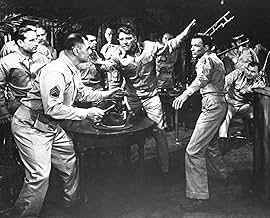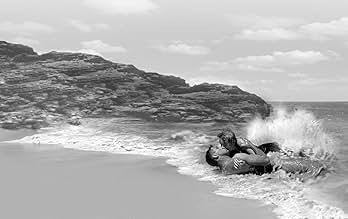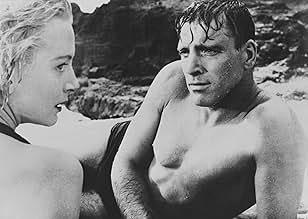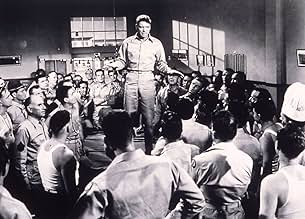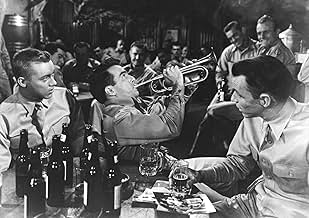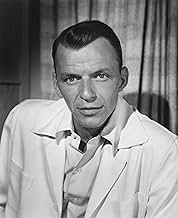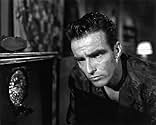Ein Soldat wird 1941 auf Hawaii grausam bestraft, weil er nicht im Team seiner Einheit geboxt hat, während sich die Frau seines Kapitäns in den stellvertretenden Kommandeur verliebt.Ein Soldat wird 1941 auf Hawaii grausam bestraft, weil er nicht im Team seiner Einheit geboxt hat, während sich die Frau seines Kapitäns in den stellvertretenden Kommandeur verliebt.Ein Soldat wird 1941 auf Hawaii grausam bestraft, weil er nicht im Team seiner Einheit geboxt hat, während sich die Frau seines Kapitäns in den stellvertretenden Kommandeur verliebt.
- Regie
- Drehbuch
- Hauptbesetzung
- 8 Oscars gewonnen
- 26 Gewinne & 9 Nominierungen insgesamt
Claude Akins
- Sgt. 'Baldy' Dhom
- (Nicht genannt)
Vicki Bakken
- Suzanne
- (Nicht genannt)
Margaret Barstow
- Roxanne
- (Nicht genannt)
Empfohlene Bewertungen
In hindsight, this 1953 classic doesn't seem as much a military drama as it does a highly charged soap opera, which shouldn't come as a surprise given that master filmmaker Fred Zinnemann ("the Nun's Story") was at the helm. The veteran director upended the western genre just a year earlier with the Gary Cooper classic "High Noon", and he places the same incendiary focus of character over action here, that is, until the inevitable climax which uses the Japanese attack on Pearl Harbor as a catharsis for the characters' dilemmas now dwarfed by the coming world war.
Based on James Jones' epic novel, screenwriter Daniel Taradash manages to reduce the complexity of the book's themes without trivializing them, and then-offbeat casting enhances the movie immeasurably. Set on a U.S. Army base in Hawaii in the months leading up to the attack, the focus is on two men, both dedicated to the military with no aspirations to become the officers they have grown to detest. One is Private Robert E. Prewitt, a talented boxer (and bugler) who refuses to fight on his regiment's team since blinding a sparring partner. The other is First Sergeant Milton Warden, a take-charge, professional soldier who earns the trust of his men even as he kowtows to his weak-willed commanding officer.
Life in the barracks is fraught with adversarial personalities, chief among them Private Angelo Maggio, Prewitt's loudmouthed best friend, and Staff Sergeant "Fatso" Judson, the sadistic stockade warden. Both Prewitt and Warden meet women who seek to change their lives. Prewitt finds cynical nightclub "hostess" Lorene at a brothel masquerading as a social club, while Warden embarks on a passionate affair with his commanding officer's wayward wife Karen. Burt Lancaster is well cast as Warden, and he brings surprising nuance to his character's clandestine encounters with Karen. However, it's Montgomery Clift - despite looking too slight to be genuinely believable as a boxer - who transcends his loner role by playing off his innately sensitive nature to portray a man who will never sacrifice his honor despite how dire the consequences. Well within his comfort zone, Frank Sinatra's turn as Maggio is small but impactful.
Still two years away from "Marty", Ernest Borgnine makes Judson's malevolence palpable in just a few scenes. Deborah Kerr submerges her Scottish accent and previous lady-like demeanor to reveal the embittered, sexually assertive side of Karen without sacrificing any of the character's vulnerability. The legendary, much-parodied beach scene with Lancaster still sizzles after all these years. Similarly, Donna Reed foregoes her good-girl image (epitomized by her memorable turn as Mary Bailey in "It's a Wonderful Life") to play the sultry, delusional Lorene. The 2003 DVD comes with a small set of extras - a three-minute making-of retrospective short, a nine-minute collection of on-set footage and interviews from a documentary entitled "Fred Zinnemann: As I See It", and the original theatrical trailer. The best extra is the commentary track from Tim Zinnemann (the director's son) and screenwriter Alvin Sargent ("Spider-Man 2"), who had a small role in the movie.
Based on James Jones' epic novel, screenwriter Daniel Taradash manages to reduce the complexity of the book's themes without trivializing them, and then-offbeat casting enhances the movie immeasurably. Set on a U.S. Army base in Hawaii in the months leading up to the attack, the focus is on two men, both dedicated to the military with no aspirations to become the officers they have grown to detest. One is Private Robert E. Prewitt, a talented boxer (and bugler) who refuses to fight on his regiment's team since blinding a sparring partner. The other is First Sergeant Milton Warden, a take-charge, professional soldier who earns the trust of his men even as he kowtows to his weak-willed commanding officer.
Life in the barracks is fraught with adversarial personalities, chief among them Private Angelo Maggio, Prewitt's loudmouthed best friend, and Staff Sergeant "Fatso" Judson, the sadistic stockade warden. Both Prewitt and Warden meet women who seek to change their lives. Prewitt finds cynical nightclub "hostess" Lorene at a brothel masquerading as a social club, while Warden embarks on a passionate affair with his commanding officer's wayward wife Karen. Burt Lancaster is well cast as Warden, and he brings surprising nuance to his character's clandestine encounters with Karen. However, it's Montgomery Clift - despite looking too slight to be genuinely believable as a boxer - who transcends his loner role by playing off his innately sensitive nature to portray a man who will never sacrifice his honor despite how dire the consequences. Well within his comfort zone, Frank Sinatra's turn as Maggio is small but impactful.
Still two years away from "Marty", Ernest Borgnine makes Judson's malevolence palpable in just a few scenes. Deborah Kerr submerges her Scottish accent and previous lady-like demeanor to reveal the embittered, sexually assertive side of Karen without sacrificing any of the character's vulnerability. The legendary, much-parodied beach scene with Lancaster still sizzles after all these years. Similarly, Donna Reed foregoes her good-girl image (epitomized by her memorable turn as Mary Bailey in "It's a Wonderful Life") to play the sultry, delusional Lorene. The 2003 DVD comes with a small set of extras - a three-minute making-of retrospective short, a nine-minute collection of on-set footage and interviews from a documentary entitled "Fred Zinnemann: As I See It", and the original theatrical trailer. The best extra is the commentary track from Tim Zinnemann (the director's son) and screenwriter Alvin Sargent ("Spider-Man 2"), who had a small role in the movie.
I really enjoyed this film. Frank Sinatra walked away with the Oscar, but I thought Montgomery Clift's performance was the standout. I know they weren't competing against one another, but if any actor were to win an Oscar I would have preferred Clift. Lancaster and Kerr gave the other great performances. I liked the interaction between Clift's and Lancaster's characters, particularly in the scene when Lancaster is telling Clift he could avoid fatigue duties 'if he were smart'. Clift replies 'Yeah, but I ain't smart', and Lancaster says 'I know, I know but if you were...'
I thought the best parts of this film came from the great acting of Kerr, Lancaster and Clift. It may suffer from being called a classic, making people's expectations high, but I thought it was very enjoyable.
I thought the best parts of this film came from the great acting of Kerr, Lancaster and Clift. It may suffer from being called a classic, making people's expectations high, but I thought it was very enjoyable.
The folks who made PEARL HARBOR should have done their homework on how to bring a personal romance into a historical event. This film should have been at the top of their list.
The Pearl Harbor attack is the climax of the film as well as of the various intricate human relationships in the film. This is a classic piece of romantic history, and the beach scene is probably one of the most erotic ever done -- all the more impressive because it has no nudity.
This is a real saga of human passion and how it is affected by history. Whether you see PEARL HARBOR or not is up to you. But definitely see this film.
The Pearl Harbor attack is the climax of the film as well as of the various intricate human relationships in the film. This is a classic piece of romantic history, and the beach scene is probably one of the most erotic ever done -- all the more impressive because it has no nudity.
This is a real saga of human passion and how it is affected by history. Whether you see PEARL HARBOR or not is up to you. But definitely see this film.
1941. Private `Prew' Prewitt has been transferred to Hawaii. His new captain is keen to get promoted and sees Prew's former boxing prowess as his way to get noticed. However Prew has given up boxing and refuses to join the team leading the Captain to punish him in many different ways. Meanwhile Sergeant Warden is beginning an affair with the Captains maltreated wife. Prew himself finds a girl but his friend Maggio has conflict with Sergeant Judson. Meanwhile the threat of attack looms.
This is most famous for Warden and Holmes' adulterous passion as the waves lash over them. Probably people who haven't seen the film will still know that scene. However this film is much more than that. The plot has several main strands mostly involving romance running through it. It works well but it is really a soapy melodrama at the end of it all. This doesn't mean it's not enjoyable and intense but it is really that basic. The Pearl Harbour attack is tacked onto the end and didn't really grab me.
The central relationships are OK but the film is strongest in some very good male performances. Clift is great as the put upon private, while Lancaster deserves recognition for more than just snogging Kerr on a beach. Kerr and Reed are OK Kerr is better but none of the female roles are as good as the male leads. Warden, Sinatra and Borgnine are all great support and steal the show when they are on screen (Sinatra especially).
Overall I was surprised to see this film being hailed so high in many polls. I found it to be involving, interesting and well acted but at it's core it is a melodrama that has a few bangs at the end. Worth a watch.
This is most famous for Warden and Holmes' adulterous passion as the waves lash over them. Probably people who haven't seen the film will still know that scene. However this film is much more than that. The plot has several main strands mostly involving romance running through it. It works well but it is really a soapy melodrama at the end of it all. This doesn't mean it's not enjoyable and intense but it is really that basic. The Pearl Harbour attack is tacked onto the end and didn't really grab me.
The central relationships are OK but the film is strongest in some very good male performances. Clift is great as the put upon private, while Lancaster deserves recognition for more than just snogging Kerr on a beach. Kerr and Reed are OK Kerr is better but none of the female roles are as good as the male leads. Warden, Sinatra and Borgnine are all great support and steal the show when they are on screen (Sinatra especially).
Overall I was surprised to see this film being hailed so high in many polls. I found it to be involving, interesting and well acted but at it's core it is a melodrama that has a few bangs at the end. Worth a watch.
... from what we feed on these days and perhaps only of relevance as an artefact of the time it was released and the period it reflects, the way we behave and interact in the real world has changed unrecognisably since. It does, however, deliver us some top drawer performances from some genuinely talented performers, most of them to go on to much bigger and better things. All in all, a solid 1950s era film set in the prior decade before the outbreak of war, it uses multiple and interlinked sub plots to show us the sorrow and sadness experienced by numerous characters as a result of the choices they've made, the people they met and how they interacted.
Oscars Best Picture Winners, Ranked
Oscars Best Picture Winners, Ranked
See the complete list of Oscars Best Picture winners, ranked by IMDb ratings.
Wusstest du schon
- WissenswertesMontgomery Clift threw himself into the character of Prewitt, learning to play the bugle (even though he knew he'd be dubbed) and taking boxing lessons. Fred Zinnemann said, "Clift forced the other actors to be much better than they really were. That's the only way I can put it. He got performances from the other actors, he got reactions from the other actors that were totally genuine."
- PatzerThe impromptu bugle solo in the club includes notes that only a trumpet could hit.
- Zitate
Robert E. Lee "Prew' Prewitt: Nobody ever lies about being lonely.
- Crazy CreditsOpening credits prologue: SCHOFIELD BARRACKS HAWAII 1941
- VerbindungenEdited from Der 7. Dezember (1943)
- SoundtracksRe-enlistment Blues
(1953)
by James Jones, Fred Karger, Robert Wells
Sung by men in the barracks twice
Played often in the score
Top-Auswahl
Melde dich zum Bewerten an und greife auf die Watchlist für personalisierte Empfehlungen zu.
Details
- Erscheinungsdatum
- Herkunftsland
- Sprache
- Auch bekannt als
- De aquí a la eternidad
- Drehorte
- Halona Beach Cove, O'ahu, Hawaii, USA(Warden and Karen's kissing in the surf scene)
- Produktionsfirma
- Weitere beteiligte Unternehmen bei IMDbPro anzeigen
Box Office
- Budget
- 1.650.000 $ (geschätzt)
- Bruttoertrag in den USA und Kanada
- 36.416 $
- Eröffnungswochenende in den USA und in Kanada
- 18.176 $
- 7. Dez. 2003
- Weltweiter Bruttoertrag
- 36.416 $
- Laufzeit
- 1 Std. 58 Min.(118 min)
- Farbe
- Sound-Mix
- Seitenverhältnis
- 1.37 : 1
Zu dieser Seite beitragen
Bearbeitung vorschlagen oder fehlenden Inhalt hinzufügen



